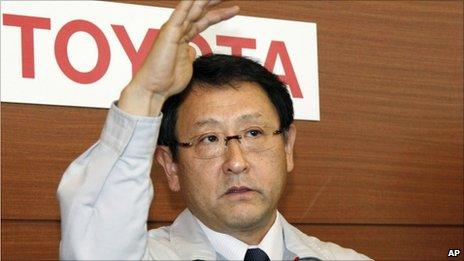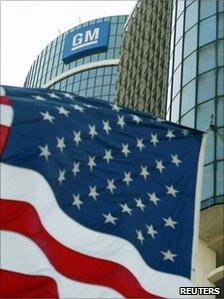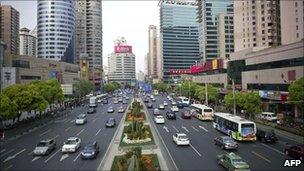Changed landscape for global carmakers
- Published

Toyota Motor president Akio Toyoda's challenges are growing by the day
The earthquake that hit Japan on 11 March, causing a tsunami and a nuclear crisis, did more than rock the country.
Japan's motor industry was also shaken badly, with many of its parts suppliers hit.
A warning by the country's leading car-maker, Toyota, that parts shortages could curb output this year, coincided with booming sales and profits at its main global rival, General Motors (GM).
GM has just announced it is planning to invest $2bn (£1.2bn) in plants in eight US states, as well as creating hundreds of jobs.
Fellow US car-maker Ford has also reported bumper profits and sales. And even the country's third-largest automotive company, Chrysler, is back in the black.

American strength should help, as US car-makers prepare to conquer Asia
Less than two years ago, GM and Chrysler filed for bankruptcy and were bailed out by US taxpayers, while Ford had to sell its luxury division, which included Jaguar, Land Rover and Volvo cars.
At the time, Toyota and the other Japanese car-makers were gaining ground in the troubled Detroit-based companies' home market.
Asian growth
The timing of this latest see-saw shift in the global automotive landscape is significant, coming as it does on the eve of an anticipated boom in sales across Asia.
China's already buoyant market is set for continued dramatic expansion, an Indian sales surge appears imminent, and the rest of Asia is also set to be an engine for growth for the motor industry on the back of strong economic performance across the region.
This might result in GM regaining the top spot as the world's bestselling carmaker, as Toyota slips lower down the ranking list.

Asia will be the next battle-ground for the global motor industry
But neither company will consider this important.
Toyota, which was only just recovering from last year's mass recalls of faulty cars when the earthquake hit, says it has never been chasing volume as its focus has always been on quality and on profit margins.
GM says it no longer cares about being number one - not, at least, not if it results in lower profits, and plans to end discounts aimed at simply getting cars off the forecourts.
But the Americans and the Japanese are up against some exceptionally competent competition from European and South Korean car-makers.
And when benchmarked against some of their rivals from these regions, both can appear weak, regardless of how they compare with each other.